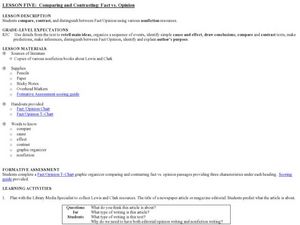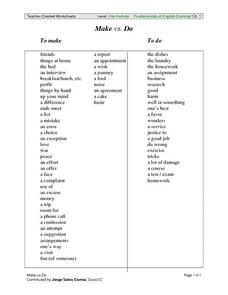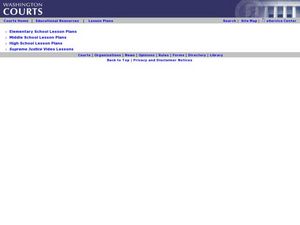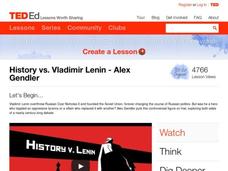The New York Times
Big Brother vs. Little Brother: Updating Orwell's 1984
Government surveillance is an enduring conflict that has become increasingly complex with our nation's use of technology. Add to the understanding of Orwell’s 1984 by using the resources here that display the contemporary actions of Big...
Curated OER
Themes vs. Timelines
Teaching history through a thematic curriculum fosters a higher level of engagement and critical thinking in young historians.
PBS
Character vs. Society in The Invisible Man
Ralph Ellison's Invisible Man is difficult to read and difficult to teach. The novel is so highly regarded that it is one of most often listed as an option for the AP Literature and Composition exam. The materials in this packet from PBS...
Curated OER
Barter vs. Money
First graders listen to the book, Sheep in a Shop, that leads them to think about making financial decisions, trading, and the barter system. After the book is read aloud, a discussion ensues about some of the things that the sheep...
Project Tahoe
Individual Rights vs. The Greater Good Within the Scope of War
When, if ever, is the government justified in restricting individual rights? When, if ever, should the "greater good" trump individual rights? To prepare to discuss this hot-button topic, class members examine primary source documents,...
Curated OER
Comparing and Contrasting: Fact vs. Opinion
Elementary schoolers investigate nonfiction stories by analyzing facts and opinions. They read nonfiction stories about the Lewis and Clark expedition. Pupils utilize a T-chart to list the facts and opinions on opposite sides, and then...
Curated OER
Make vs. Do
In the make vs. do worksheet, students review two columns, one listing things to make and the second listing things that can be done.
Curated OER
Social Studies: Segregation, Jim Crow Laws, Plessy vs. Ferguson
Students examine the concept of segregation. In this civil rights lesson, students discuss the separate but equal theory as well as the Plessy vs. Ferguson decision. Students also research women of the Civil Rights Movement and Jim Crow...
Curated OER
Going to a Party: Say vs. Tell
For this say vs. tell worksheet, students fill in the blanks to sentences with forms of say and tell. Students do this for 8 sentences.
Council for Economic Education
New Sense, Inc. vs. Fish 'Till U Drop or Coase Vs. Pigou
Who is responsible for protecting the environment, and who should pay when it is damaged? The role of government and private industry is complicated. A role-play simulation prompts individuals to decide how to protect a fictitious town...
Curated OER
Brown vs. the Board of Education: Still Opening Eyes
When we use our collective voices to help others, we all benefit.
Curated OER
Needs vs. Wants Fill in the Blank List
In this needs vs. wants worksheet, students work with a partner to write a list of wants and a list of needs. They read the differences between wants and needs before making their lists.
National Endowment for the Humanities
Factory vs. Plantation in the North and South
North is to factory as South is to plantation—the perfect analogy for the economy that set up the Civil War! The first lesson in a series of five helps teach beginners why the economy creates a driving force for conflict. Analysis of...
Freecloud Design
Presidents vs. Aliens™
People of all ages can enjoy identifying and learning about the US Presidents by playing this entertaining game. Quiz questions cover identifying the president, political party, predecessors and successors, nicknames, quotes, general...
College Board
Random Variables vs. Algebraic Variables
Variables can vary in meaning. A reference material for AP® Statistics explains the difference between random and algebraic variables. It provides a hypothetical situation involving dice—great for use in a classroom situation.
Curated OER
Homeschool Helper's: Butterfly vs. Moth
In the butterfly vs moth worksheet, students read the sentence and write a B if it describes a butterfly and an M if it describes a moth. There are 7 questions to answer.
Curated OER
Exploring United States vs. Hirabayashi
Students research the case of Gordon Hirabayashi vs. the United States. They research the case by completing a timeline activity and review the charges against him. Students review the entire case and discuss it from the perspective of...
Curated OER
British English vs. American English
For this British vs. American English worksheet, students choose which American English words are the equivalent to the British English words. Students complete 10 multiple choice questions.
TED-Ed
History vs. Vladimir Lenin
Vladimir Lenin is on trial in an engaging, animated video where the merits and consequences of the formation of the Soviet Union and Lenin's actions are reviewed. This is a great way to illustrate how to establish and argue unique...
Thomas Jefferson Foundation
Personal Morals vs. Political Moves
Was Thomas Jefferson a hypocrite? That is the question facing class members as they examine excerpts from documents that relate to Jefferson's beliefs about slaves and slavery.
Physics Classroom
Distance vs. Displacement
Home is where your displacement is zero. Scholars practice solving distance versus displacement problems of increasing difficulty. They begin with two stage motion and, by the wizard level, each problem has four stage motion to consider....
Judicial Learning Center
State Courts vs. Federal Courts
Popular culture often portrays the Feds as the most fearsome of law enforcement agencies. Yet, someone charged with a crime is considerably more likely to end up in a state court. The lesson, one of six covering the Organization of the...
PBS
Stereotypes vs. Statistics (Grades 9-12)
What is a common stereotype people may think about you; is it true? Using a thought-provoking lesson, high schoolers analyze common stereotypes of the Latino-American population versus statistical data. Scholars review data and have the...
PBS
Stereotypes vs. Statistics (Grades 4-8)
Stereotypes can be painful if they are used to discriminate against others. Statistics, however, can be helpful in dispelling myths propagated by stereotypes. Using a thoughtful lesson plan, scholars complete graphic organizers and...
Other popular searches
- Fact vs. Opinion
- Brown vs. Board of Education
- Patriots vs. Loyalists
- Nature vs Nurture
- Good vs. Evil
- Communism vs Capitalism
- Endothermic vs. Exothermic
- Teaching Fact vs. Opinion
- Fact vs Opinion
- Exponential vs. Linear
- Needs vs Wants
- Mitosis vs Meiosis

























